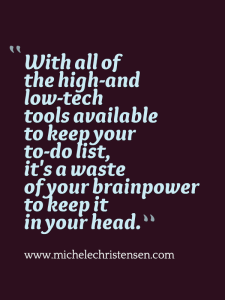 Lately, I’ve heard from a few successful business people that they don’t keep much of a to-do list because “If it’s important, I’ll remember it.” Is this really true? Is it a good way to run your business?
Lately, I’ve heard from a few successful business people that they don’t keep much of a to-do list because “If it’s important, I’ll remember it.” Is this really true? Is it a good way to run your business?
In both cases, the logic was something along the lines of running your business (and life) more intuitively and trusting your mind to call up the important items and leave the rest behind. It sounds nice, and who doesn’t want to have that kind of freedom?
My first concern with this type of task management is that it’s an inefficient use of your best resource, your mind. Lists can easily be kept on paper or in a tech resource, and both of these are very well suited to keeping large amounts of data. Your brain isn’t. Humans have good retention for just a handful of things at a time, and then it gets hazy. How much more creative and productive are you when the slate is cleared, your mind free and you are calm?
The second problem with this approach is that it can cause stress if you don’t have absolute faith in your mind’s ability to choose and call up the best thing to be working on. Maybe some people’s minds can do this and they are absolutely comfortable with that trust, but if you have any doubt at all you run the risk of using valuable brain power to keep track of things that could easily be stored elsewhere. I don’t doubt that most people’s minds can call up some tasks to work on, but I know what I go through to pick the best thing to do right now and it’s not a simple decision. I’m not sure anyone’s mind can be trusted to do long-term planning and to weigh all the factors in deciding what to work on.
My third and biggest concern with this is the waste of brilliant ideas! How often does an idea come to you at an odd time when you would never expect genius to strike? It happens to me a lot. I often tell my clients to let me stew on something and I’ll answer them in a few days. Later, while I’m folding laundry, doing dishes or driving I’ll get great idea out of nowhere and the problem is solved. If you don’t record them somewhere, you run the risk of losing them forever and that’s pretty sad. Record it in some central place, and you have a stockpile of great ideas just waiting for you to act on them.
As with most things, the right answer is what works best for you. It’s important to make sure that whatever method you use to pick your next tasks is one that supports you doing your important work in the world and doesn’t hinder you.

I have always worked this way… to write down my good ideas while they’re in my mind nice and fresh. Even when I was around 7 years old and in class at school and the teachers said, ‘Okay, pencils down, time to go onto new work!’ I still needed to finish my idea; so I didn’t depend on my memory to hold onto it otherwise I never knew what the hell the teacher was blathering on about (yep, good ol’ me with the one track mind there!). So, I kept on writing until I finished my work – be it 3 words or 3 sentences, I got it finished and I could give my teacher my full attention… but this really ticked off the teachers and they started taking my pencils off me. Stupid people.
Now, I do the same technique now and I’m 39 years old. If I don’t write down the good idea while I have it, I’ll never remember the darned thing! Also, I’m a list-maker. When I go shopping I take a list otherwise I’ll never remember what the hell to buy! From the smallest things to the biggest, I put it on the shopping list, if I haven’t written it down, I don’t get it.
So writing things down is a must-do thing for me. It’s something I can’t do without. And yes, I have notepads all over the house; and have just recently found out that I have so many notepads of all shapes and sizes that they fill a drawer under where I put the cordless phone to recharge! Wow! Now, that’s a lot of notepads!
Mozette, I too make my lists very detailed! Why bother even trying to remember everything when a list remembers so much better.
I completely agree with you, Michele! Too often, I’ve had amazing ideas that were forgotten nearly instantly because I didn’t get them on paper or electronically captured in the moment. With always having competing personal and professional priorities and projects on the brain, I’ve found it absolutely necessary to use to do lists. I use a combo of paper, white board and electronic tools (primarily Evernote) to make sure important tasks and ideas don’t slip through the cracks.
As always, you’ve provided sound advice!
Thanks Dawn! I too use a combo of tools (high and low tech). It just works for me.